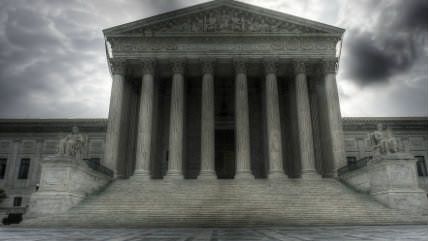Supreme Court Shouldn't Ignore Constitution to Save Obamacare
We've reached a point where liberals argue that the court should avoid disrupting any laws that are driven by progressive notions of compassion.

If the Supreme Court dismantles a core provision in Obamacare, America will be plunged into a pre-2010 level of dystopia—or worse. If Democrats were to be forced by the court to follow the law they wrote, then 36 states that aren't interested in hosting federal "exchanges" would no longer be forced to do so, and consequently, the American dream would be shattered.
So needless to say, the pending Supreme Court challenge over the Affordable Care Act via King v. Burwell is the most significant decision since Hobby Lobby or perhaps Citizens United—or whenever the most recent time was when the world was going to come tumbling down around us. And while pretending that the legal challenge is laughably weak—a politically motivated charade that has absolutely no chance of success—most left-wing pundits who've weighed in on the matter feel oddly compelled to urge SCOTUS to contemplate a whole host of factors that have nothing to do with the law.
Here is The Washington Post's Greg Sargent laying out the case:
The reason this matters: Highlighting the potential for such a SCOTUS decision to result in widespread disruptions and dire consequences -- both for millions who might lose coverage and for the insurance and health care industry in these states -- may figure heavily in the government's strategy for winning the case. Now, it's possible that expected swing vote John Roberts won't bother considering such disruptions and consequences in reaching his decision. But who knows -- he just might. And the stakes continue to grow.
"Widespread disruptions and dire consequences"—chilling stuff. Obviously, the court isn't immune to the vagaries of political life. It's unfortunate but no doubt a permanent feature of any court that's populated by human beings. Even a number of Republicans and libertarians have argued that a replacement health care bill would make it easier for the court to act. That may well be true. But there is an enormous difference between a justice holding an ideological or legal outlook and one surrendering to the politics of the day. Liberals are hoping they can make the latter a reality.
Most bothersome, though, is the fact that the left doesn't even bother pretending that the Constitution is more important than acts of progressive righteousness. We see it with left-wing groups openly pushing for more executive actions that directly circumvent legislative process. We see it with King v. Burwell, as well. Chief Justice John Roberts will have blood on his hands if he undermines progress; never mind the case. That this is the sort of reasoning that "may figure heavily in the government's strategy for winning the case" is a depressing commentary on the administration's contempt for the court.
We've reached a point where liberals argue not only that empathy (well, selective empathy, as you might imagine) should play a leading role in legal decisions but also that the court should avoid disrupting any laws that are driven by progressive notions of compassion. You know, because of the "consequences." And seeing as progressives treat all their reforms as consecrated acts of charity, this would create a rather convenient legal environment for them.
But of course, they don't really want justices to use their own moral discretion. What if, for instance, the majority of justices believed that it is Obamacare that is the most disruptive force in the country today? What if they believed ridding America of the ACA would benefit most Americans? If the justices defused Obamacare, think of all the disrupting taxes and regulations they would be saving citizens from. What if justices reasoned that killing Obamacare would be the most compassionate thing to do? Would the left still argue that they should worry about consequences—or would their position become "political"?
Incidentally, where were all these concerns about disruptions and consequences when a fleeting majority unilaterally stuffed a major reform down the throats of all Americans?
Unlike some self-styled legal scholars with unflinching moral certitude, I don't know whether the King v. Burwell challenge will be successful on the merits. But when the idea that a mere typo had caused all the confusion over state subsidies was debunked, it became necessary to find an alternative argument for public consumption. Liberals chose histrionics. The idea that lifting subsidies for a relatively small number of newly insured Americans would result in the collapse of entire state insurance markets or create unmanageable havoc is not only risible but transparently political. And anyway, if these government-run exchanges were "marketplaces" of any kind, this lawsuit wouldn't matter.


Show Comments (10)